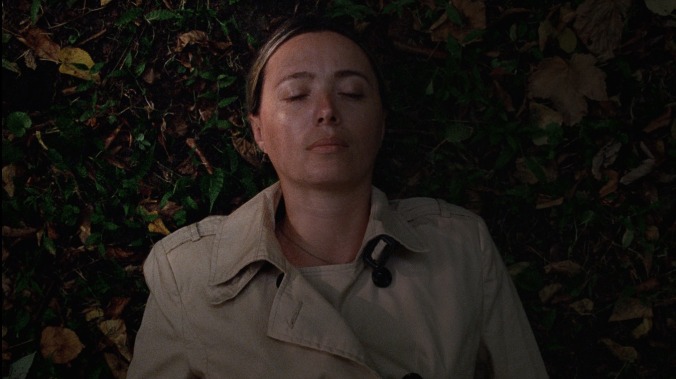Georgia’s slow-burn Oscars entry Beginning unravels a crisis of faith, one trauma at a time


Inside the viewfinder of a camera lies an entire world. Few films are as acutely aware of this fact as Beginning, Georgia’s official entry into this year’s Oscars race and the feature debut of director Déa Kulumbegashvili. (It was also the recipient of high-profile awards at the San Sebastián and Toronto international film festivals.) Shot in a claustrophobic 1:33:1 aspect ratio, Kulumbegashvili’s film thoughtfully utilizes not only the space within the frame but also what lies just beyond it to transport the viewer into its protagonist’s fragile mental state. Amid moments of extreme stillness, violence crouches just out of sight, waiting for the characters—and the audience—to let down their guard.
Yana (Ia Sukhitashvili) lives in a state of perpetual waiting. The wife of the leader of a community of Jehovah’s Witnesses, she and the rest of the congregation are periodically attacked by the unseen extremists who firebomb a church meeting in the film’s opening scene, which unfolds in a single ominously protracted shot. These terrifying events seem to be commonplace, so much so that Yana’s husband, David (Rati Oneli, who also cowrote the script), chastises her for letting their terrified young son, Giorgi (Saba Gogichaishvili), sleep in their bed the night of the attack. Soon, David is off to secure funding to rebuild their meeting house, leaving Yana alone with her child and troubling emotions she can’t quite articulate.
As the hints of dissatisfaction in Yana’s life begin to bubble to the surface, Kulumbegashvili’s camera also comes to life. But this is no uplifting, you-go-girl tale of a woman discovering her power; Kulumbegashvili and Oneli’s vision is more transgressive than that. To be sure, this is a condemnation of the oppressive patriarchal systems that lead Yana to believe that no course of action but the one she ultimately adopts is possible. But as the camera subtly shifts from mere observer of violence to a voyeuristic, even tacitly predatory participant, the viewer is also filled with a vague sense of danger and unease.
It speaks to her talent as a director that Kulumbegashvili is able to manipulate the movie’s tone solely through filmmaking devices. Beginning is composed almost exclusively of long, unbroken shots, pulling focus to emphasize the sensation of being boxed into a space deeper than it is wide. The passivity with which the camera observes the fiery destruction of the first act is later weaponized in a harrowing scene of sexual assault, as an attacker literally appears from just outside the frame and surprises Yara in a moment of solitude. The natural beauty of the riverbed where the assault takes place only enhances the discomfort, and Kulumbegashvili’s habit of fixing her camera on one half of a dialogue scene so the other party is heard but not seen takes on the high-pressure feel of an interrogation as the story gets more twisted.
Grasping for the “meaning” of Yana’s ordeal will likely leave viewers fumbling in the dark, which makes sense given that she also isn’t sure what to make of the obscure hunger that’s slowly poisoning her. There are no answers, merely a plainspoken depiction of misogynist violence and one woman’s response to it—a controlled approach that’s reflected in Sukhitashvili’s restrained performance. This all makes Beginning a distressing watch—and that’s after you get through the equally provocative but less engaging inactivity of the film’s first half. (If you think your wifi has gone out during the unbroken seven-minute shot of Sukhitashvili lying on her back in the forest with her eyes closed, it hasn’t. The audio is supposed to drop.) Whether this challenging film is more than the sum of its formally inventive parts will depend on a viewer’s patience, as well as their tolerance for ambiguity and discomfort.
But amid the trauma we also find moments of peace and even grace, punctuated by a haunting final image that brings the story back to its biblical beginnings. Midway through the film, Yara asks one of her catechism students, “What is heaven?” “I think it’s a coffin,” the child replies. That’s as good of a summation of what this film is getting at as any other.